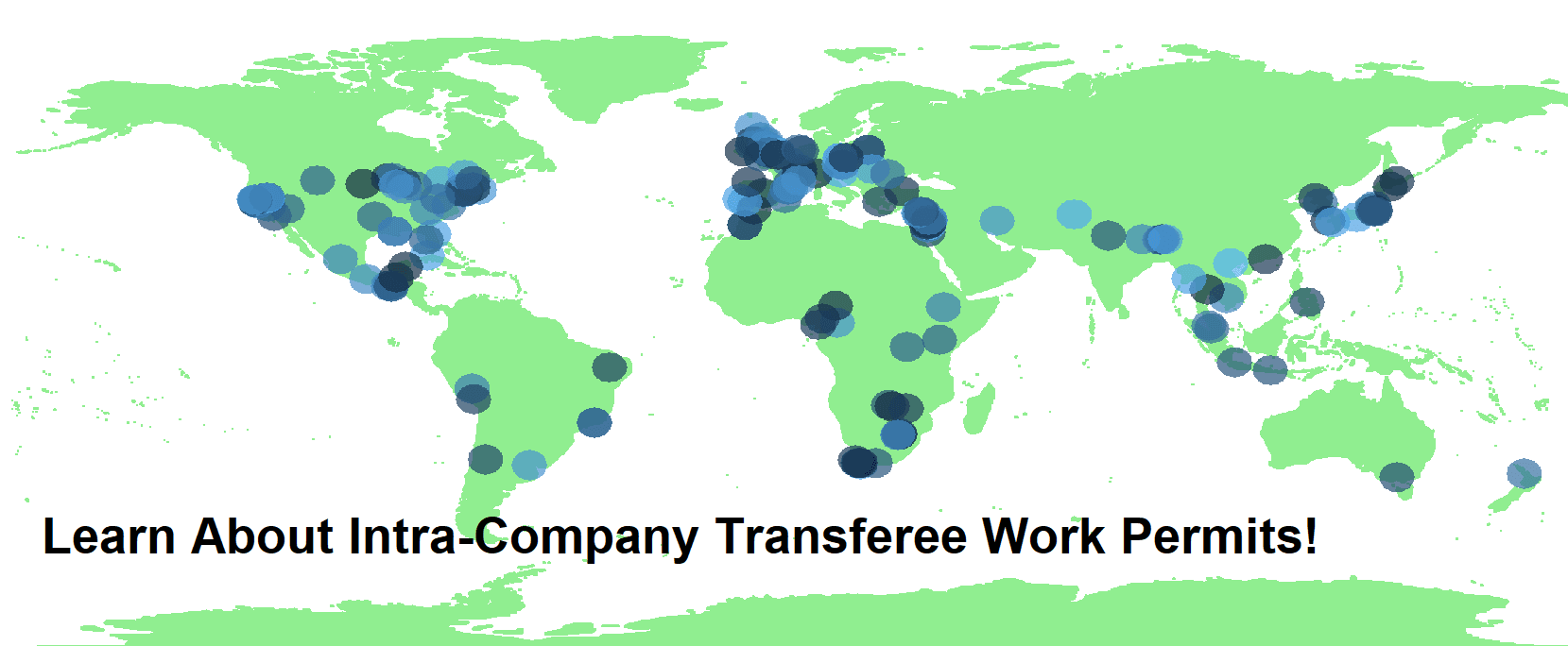About Intra-Company Transferee Work Permits
What is the International Mobility Program?
There various different work permits one could apply for which would give them permission to work legally in Canada. The reason there are so many different work permits for individuals to choose from is that the Canadian government recognizes that there are a variety of different circumstances individuals who wish to work in Canada, are facing. Therefore, the different work permits exist to suit each individual’s circumstance, and provide each individual a permit which gives them the necessary permissions to have success in their specific endeavors. For example, some work permits are available through the international mobility program (IMP). Work permits available through the IMP lets employers hire temporary workers without a Labour Market Impact Assessment (LMIA), unlike the temporary foreign worker program (TFWP). Work permits available through the international mobility program are LMIA exempt because they have special permissions through a bilateral or multilateral agreement the Canadian government is party to. In this article, we will work to help you understand the intra-company transferee work permit, which runs through the international mobility program.
What is an Intra-Company Transferee Work Permit?
Through the international mobility program, one option is an intra-company transferee work permit. This type of work permit is useful for individuals who work for trans-national corporations (TNCs), otherwise known as multi-national corporations. From time to time, an individual who works for a company which has branches or affiliates in difference parts of the world may have the opportunity to re-locate to a country like Canada. Though, to work in Canada, everyone who is not a Canadian citizen or permanent resident needs a work permit. An intra-company transfer work permit (ICT work permit) makes it easier for these individuals to obtain permission to work for their company in Canada. Additionally, the ICT work permit brings some other benefits, but at the same time places some restrictions on the grounds the individual seeking work is coming to work with one particular company. For example, your employer does not need to obtain a positive LMIA, as mentioned. Though, an ICT work permit is essentially a closed work permit. This means, you will only have permission to work with a branch or affiliate of your original company during your time in Canada.
Eligibility for an Intra-Company Transferee Work Permit
This category of work permit was created to make it easier for foreign nationals to work in different parts of the world within their company; therefore, there are some important elements of your application for an ICT work permit, which help to establish whether or not you should be granted this special privilege.
- Firstly, it is crucial you can prove a relationship between the foreign company you currently work for, and the company inside Canada you wish to work for. The two companies must be a subsidiary, a branch, an affiliate or parent company. Generally, this is done with a business registry of the company or corporation.
- Secondly, it is essential the individual applying for the ICT work permit can show a certain level of experience within the foreign company, thereby justifying their move as valuable to the trans-national company. The requirement for the individuals personal work experience is that they have a minimum of 1 year in the past 3 years. This can be easily demonstrated with pay stubs, employment contract, and employment references and so on.
- Finally, to be eligible to be transferred within a company internationally, you must currently work in a position which is executive or managerial in nature, or requires specialized knowledge. These three positions are more valuable naturally than those of lower level employees, and therefore justifies moving a specific person internationally, to fulfill a position with an affiliate company with the knowledge and expertise current high-ranking employees already have.
Executive Capacity is defined as an employee that:
- Exercises discretionary decision-making on a large scale
- Directs the management of the organization or a major portion or function of the organization
- Establishes and sets the goals and policies of the organization, component or function
- Receives only general supervision or direction from higher level executives, the board of directions and/or stockholders of the organization
Managerial Capacity is defined as an employee that:
- Supervises and controls the work of other managers/supervisors and/or professional employees
- Has the authority to hire and/or fire, or recommend these and other personnel actions, such as promotions and leave authorization
- Manages the organization, a department, subdivision, function or component of the organization
- Exercises discretion over the daily operations of the activity or function for which the employee has authority
Specialized Knowledge
Some individuals require “knowledge at an advanced level of expertise” and “proprietary knowledge of the company’s product, service, research, equipment, techniques or management” to fulfill their positions properly, according to Canada’s commitment in the General Agreement on Trade in Services (GATS). In order to qualify as an Intra-Company Transferee with specialized knowledge, you must have both proprietary knowledge and advanced expertise. If you only acquire one of these traits, then you are not eligible for this category, because your position does not qualify.
- Proprietary Knowledge is defined as company-specific expertise related to a company’s products and/or services. This knowledge is not public knowledge by nature because it allows for the company to be discrete about the products or services, in order for other companies to not duplicate their work.
- Also you must be able to show your position requires an advanced level of expertise, which you have. An advanced level of expertise is defined as specialized knowledge which must be gained through significant and recent experience with the organization, and is consistently utilized by the individual to contribute significantly to the employer’s productivity.
Applying for an Intra-Company Transferee Work Permit
Ultimately, you have to prove that your presence in Canada will be beneficial to the Canadian economy. You will certainly not be a benefit to the Canadian economy if you cannot prove the above three things. Though, this would automatically disqualify you as eligible for an ICT work permit anyways. It is important to understand, being eligible and being granted an ICT work permit do not always go hand in hand. Oftentimes, it is underestimated how important it is to prove the value of your position by showing the necessary qualifications to do the job, and giving a detailed job description. Or, it is forgotten how important it is to show the necessary work experience to prove that the trans-national company would benefit from the employees transfer, to show how much the Canadian economy will benefit as well. Ultimately though, these are the things that make for a strong application.
The Employers Responsibilities
As with any application for a work permit, you will need to show an offer of employment from your employer, have them pay the $230 employer compliance fee and also submit an employment form online through the employer portal which is created specifically for those who part take in the international mobility program. The employer must be able to provide the following things:
- Their business number
- Employee’s contact information
- Offer of employment for 18-24 months
- Supplementary documentation if applicable
The Employees Responsibilities
Now, as the employee, it is your responsibility to submit a compelling application for the Canadian immigration officers to provide you a work permit. This means you should not be an inadmissible traveler or, you should get a temporary resident permit to deal with your inadmissibility. This also means you should ensure you are permitted to enter the country without a visa, if you are not, and you come from a non-visa exempt country, you should apply for a temporary resident visa to be permitted to enter and then work in the country. Then, you should prove you have the advanced knowledge and experience required to justify your move within your country. This will require complete disclosure of your position, work history, certifications and qualifications to prove that you work in either an executive, managerial or specialized knowledge position, and, that you are the qualified individual fit for the job. Finally, it is the employee’s responsibility to prove their intentions to work in Canada are in fact temporary, and they will respect the regulations of their work permit completely.
Contact Akrami and Associates
It is essential that you have taken all of the aforementioned requirements and documentation into consideration before you attempt to apply for an Intra-Company Transferee Work Permit. Applications for work permits, by themselves, are difficult applications to pursue on your own. Akrami & Associates has assisted many clients with different immigration matters from temporary to permanent applications. If you believe you might be eligible for an Intra company Transferee work permit to work in Canada than contact Akrami & Associates for more details at 416-477-2545. Our immigration experts have submitted many successful immigration applications and we can help you achieve your immigration goals as well. Contact us today!
With Akrami & Associates there is always a way!
Latest Immigrations News

July 6, 2025
Banned from Canada? Not Anymore!
Most people think that a criminal record shuts the door on Canada for good. But that’s simply not true. Yes, it can complicate things. Yes, border agents can (and often do) turn people away. But no, it’s not the end of the road. If you’ve served your [...]

June 30, 2025
Your Shortcut to Business in Canada: C11 Work Permit
Thinking about launching your business in Canada? Maybe you’ve spotted a gap in the market, or you’re just ready to expand your entrepreneurial journey to one of the most dynamic economies in the world. If that’s you, there’s good news: you don’t need a Canadian employer or [...]

June 24, 2025
Why Canada Visitor Visas Keep Getting Refused And How to Get Approved
Applying for a visitor visa to Canada sounds straightforward on paper. Fill out a few forms, gather your documents, pay the fee, and you’re good to go, right? Unfortunately, that’s rarely how it plays out. Refusals are far more common than most applicants expect. And if you’ve [...]

Book a Conslutation
One of our Representatives will
assist you with your matter. Book Now!
Click here

Call us for
more Information
+1-416-477-2545
Toll Free: 1-877-820-7121
Click here

Write Us (Online Form)
Complete our form and one of our
Representatives will contact you.
Click here
Subscribe To Our Newsletter


